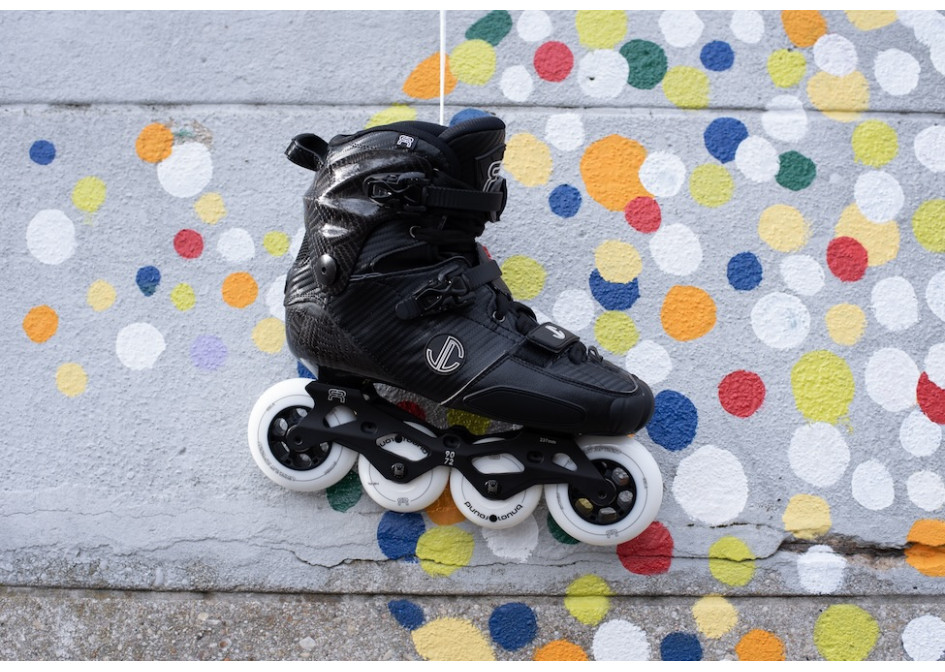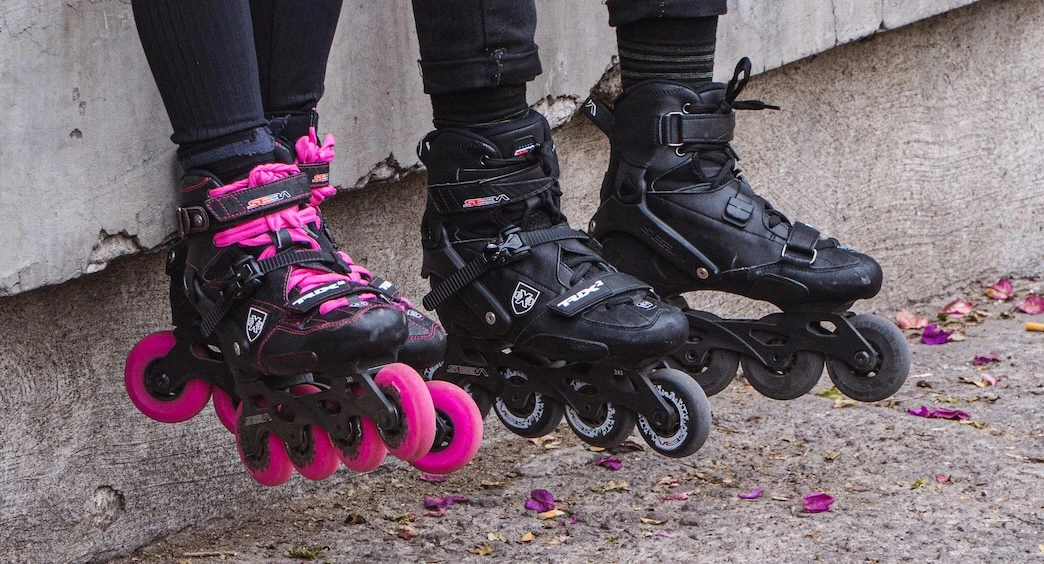Hard-Shell vs Soft-Boot Slalom Skates: Choosing the Right Fit

In the dynamic world of slalom skating, where precision, control, and agility are paramount, skaters face a crucial choice between hard-shell and soft-boot designs. Navigating the nuances of each option empowers enthusiasts to make informed decisions tailored to their unique needs and skating styles.
Hard-Shell Slalom Skates
Design and Structure
Hard-shell slalom skates stand out with their rigid outer shell, providing unparalleled ankle support and stability essential for executing intricate maneuvers. Picture gliding through a series of tight turns and complex slalom patterns with confidence, as the robust structure enhances control and precision.
Performance Focus
The firmness of hard-shell skates ensures optimal power transfer, facilitating seamless energy transmission from the skater’s movements to the wheels. This translates into heightened responsiveness and speed, exemplified by advanced skaters effortlessly conquering challenging slalom courses with grace and speed.
Durability and Protection
Beyond performance, hard-shell skates offer a shield against impacts and abrasions. Imagine navigating a slalom course filled with unexpected bumps and uneven surfaces – the durable outer shell becomes a reliable armor, safeguarding against potential mishaps and enhancing the longevity of the skates.
Real-Life Example
Picture a seasoned slalom skater confidently navigating an urban slalom course with hard-shell skates. The rigid structure empowers them to execute intricate tricks and maneuvers with precision, relying on the durability of the outer shell to endure the rigors of an unpredictable environment. A testament to the resilience and dependability of hard-shell skates in challenging, real-world scenarios.
Heat-Molded Customization
Additionally, hard-shell skates often offer the advantage of heat molding. This process allows skaters to customize the fit of their boots by heating them and molding them to the unique contours of their feet, ensuring maximum comfort and a personalized fit. This customization enhances the overall experience, addressing specific anatomical considerations and minimizing any potential discomfort during extended sessions.
Carbon Fiber Construction
Many high-end hard-shell slalom skates incorporate carbon fiber elements into their construction. This advanced material not only contributes to the overall lightweight nature of the skates but also adds strength and stiffness, further enhancing the skater’s control and performance. Skaters who value the utmost precision and responsiveness often appreciate the benefits of carbon fiber-infused hard-shell skates.

Soft-Boot Slalom Skates
Design and Flexibility
Soft-boot slalom skates, akin to traditional athletic shoes, prioritize flexibility and comfort. Envision a skating experience where the softer, more pliable construction allows for greater ankle mobility and a natural feel during every movement, adapting seamlessly to the contours of the skater’s feet.
Agility and Maneuverability
The inherent flexibility of soft-boot skates promotes agility, making them ideal for executing intricate footwork and swift transitions between slalom cones. Skaters revel in the fluidity of movements, effortlessly weaving through the course with nimble precision.
Comfort and Adaptability
Soft-boot designs excel in the comfort department, conforming closely to the shape of the foot and offering a personalized fit. As skaters embrace the lightweight nature of these skates, fatigue becomes a distant concern during extended skating sessions, amplifying the joy of the sport.
Real-Life Example
Imagine a skater confidently tackling a slalom routine in a soft-boot setup. The flexibility of the skates allows for expressive and dynamic movements, showcasing the skater’s personal flair as they effortlessly navigate the course. Soft-boot skates become a trusted companion for skaters seeking comfort without compromising on performance.
Heat-Molded Customization
Some soft-boot slalom skates also incorporate heat-molding technology, offering a similar level of customization as their hard-shell counterparts. This feature ensures a snug and personalized fit, addressing individual foot shapes and preferences. Skaters who value comfort and a tailored experience often appreciate the adaptability provided by heat-molded soft-boot skates.
Choosing the Right Fit
Skating Style and Preferences
Tailoring the choice between hard-shell and soft-boot skates to individual skating styles is crucial. Picture a skater emphasizing stability and precise control, confidently opting for hard-shell skates. Conversely, someone valuing agility and flexibility might find the soft-boot option aligning more closely with their preferences.
Real-Life Example
Consider a skater who prioritizes stability for slalom freestyle skating competitions, opting for hard-shell skates to execute intricate routines with unmatched precision. In contrast, envision another skater choosing soft-boot skates for an inline slalom session, where nimbleness and fluid transitions take precedence.
Course Terrain and Conditions
Consider the dynamic characteristics of slalom courses. Hard-shell skates excel on rough terrains, offering superior protection. Meanwhile, soft-boot skates showcase adaptability on smoother surfaces, providing the agility needed for seamless transitions between cones.
Real-Life Example
Picture a group of slalom enthusiasts exploring different courses – some rugged and challenging, others smooth and flowing. Skaters equipped with hard-shell skates confidently navigate rocky terrains, while those in soft-boot skates effortlessly glide through courses emphasizing finesse and fluidity.
Fit and Comfort
Prioritizing a snug yet comfortable fit is paramount. Hard-shell skates, with their inherent rigidity, offer robust support, while soft-boot skates snugly conform to the foot, enhancing overall comfort and allowing for extended periods of joyful skating.
Real-Life Example
Visualize a skater embarking on a marathon slalom session, embracing the snug fit of hard-shell skates to maintain stability and endurance. Contrast this with another skater relishing a leisurely freestyle session in soft-boot skates, enjoying the comfort and adaptability that allows for longer, more carefree skating experiences.
Skill Level and Progression
Beginners often appreciate the forgiving nature of soft-boot skates, with their flexibility aiding in the learning process. Advanced skaters, on the other hand, may find the precise control offered by hard-shell skates instrumental in mastering intricate maneuvers and pushing the boundaries of their skill set.
Real-Life Example
Picture a novice skater gaining confidence and skill on soft-boot skates, gradually progressing to more advanced techniques. Conversely, envision an experienced skater pushing their limits on hard-shell skates, mastering challenging routines and elevating their slalom skills. The choice between hard-shell and soft-boot skates becomes a personal journey of growth and skill development.
Conclusion
The decision between hard-shell and soft-boot slalom skates transcends personal preferences, embracing skating techniques and course characteristics. By delving into the distinct attributes of each type, skaters embark on a journey to select the optimal gear that harmonizes with their style, comfort, and performance expectations, immersing themselves in the exhilarating realm of slalom skating.
